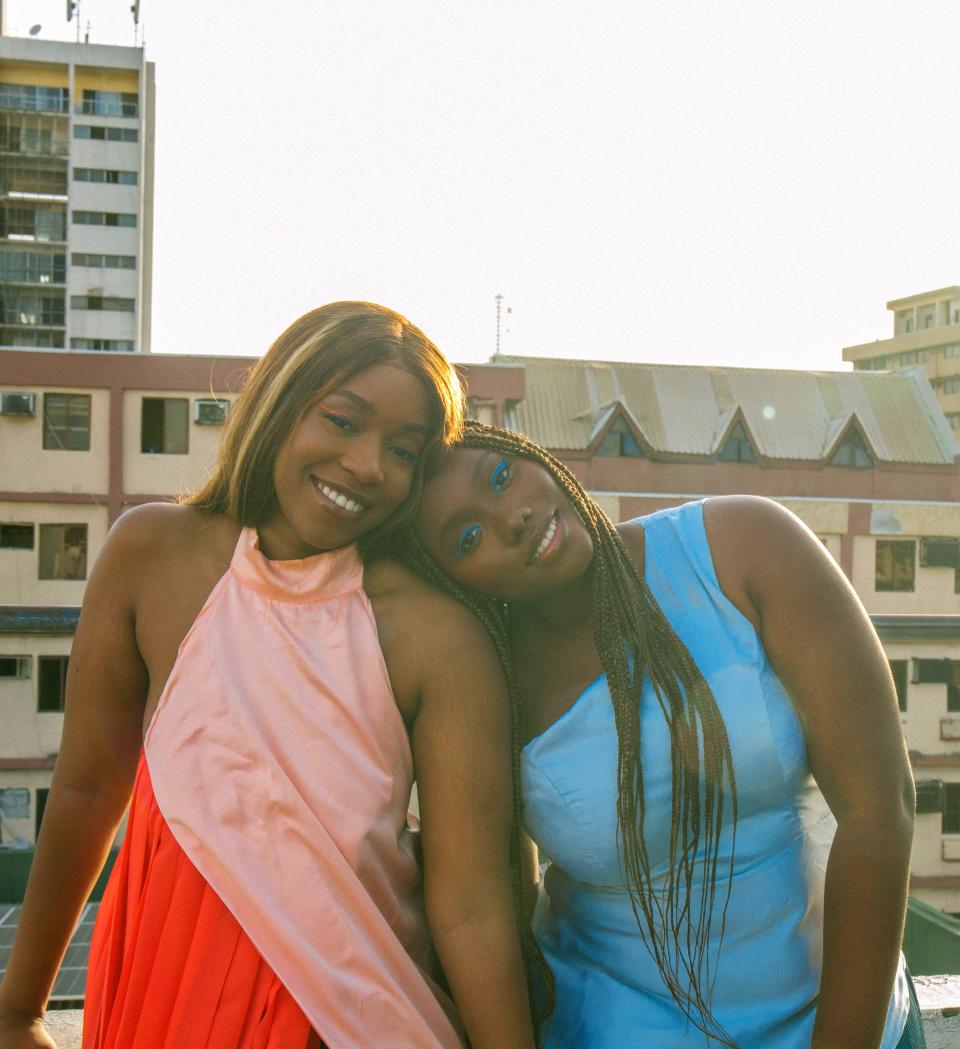In Lagos, A Female Duo Is Celebrating the Legacy of Afrobeats
- Oops!Something went wrong.Please try again later.
This story is part of a Women Who Travel collection that celebrates the female artists and music scenes we're excited about right now, from Phnom Penh to Lagos and beyond. To read more, click here.
Most days a week, music producer Olayinka Owoseni and creative consultant Yvette Ogungbe are busy inside their central Lagos, Nigeria, office, working on pushing Afrobeats, West Africa’s hip-hop, dancehall, and reggae-inspired sound out into the world. They schedule virtual performances for artists, create live recording sessions for top producers, and comb through and record hours of footage and interviews to help tell (and sell) the Afrobeats story. “Our mission,” says Owoseni, “is to document our history and preserve our culture for us, by us.”
One year ago, the pair launched Kan Àwa, an experiential marketing agency focused on doing just this. “Kan Àwa is Yoruba for ‘include us,’” says Owoseni. “We want our audience to feel like they were, in a sense, consulted throughout the process [when] we are working on music, a film, or curating an event.” The agency works with musicians, photographers, and other creatives to help tell their stories to listeners—but they also run the in-house Àwa Studios, a division dedicated to preserving Afrobeats' music legacy through interviews with key artists that tell the genre's origin stories.
This mission is shaped by what the duo—friends since childhood—have witnessed throughout their lives. At the time that Afrobeats (not to be confused with Afrobeat, the 60-year-old genre that draws influence from jazz and soul) was emerging in the clubs and studios around Lagos in the late 1990s, Ogungbe’s father, Kenny, was in Los Angeles. Recognizing the sound’s potential to be huge —he moved back home, along with his partner, Dayo Adeneye, and created the infrastructure that would turn the nascent genre into a homegrown phenomenon. Ogungbe (father) created radio stations, music TV channels, and the KENNIS Music record label, which would go on to launch the careers of Afrobeat superstars like 2Baba, The Remedies, and others. “Seeing all the sacrifices they made was really inspiring," Ogungbe says. "They left their lives in Los Angeles and moved back to Lagos to build an industry that no one had faith in."

Kan Awa
Over the following decades, Afrobeats music took off in Nigeria, topping local charts, with homegrown artists like Davido amassing over 20 million views on individual music videos on YouTube. Yet unlike the genres that have inspired it—hip-hop out of the U.S., and reggae and dancehall out of the Caribbean, Afrobeats hasn't cracked an international market in the same way.
Taking a page from her father’s book, Ogungbe, with Owoseni by her side, sees this as an opportunity to get creative. Rather than simply building up the industry, with new music and new artists and ever-more new promo, they realize they can also garner new ears—and widespread appreciation for Afrobeats—by showing those outside of Western Africa what already exists, and has for decades.
“[We realized] there is a wide gap in the documentation of Afrobeats’ history,” says Ogungbe. “With American hip-hop, you can easily find pictures of young Jay-Z hustling and what that [early] era of his life looked like. In Nigeria, we often have to ask ourselves questions like: How did we start? What were legends like 2Baba doing in 2004?” By crystalizing the Afrobeats origin story and giving it the credit it deserves, new listeners may come into the fold; and new artists will have a wider platform to build on.
Though Kan Àwa projects have included curating a live session for top Afrobeats producer Pheelz, and spearheading the music for IDENTITY, a Paris Fashion Week film directed by Ademola Falomo, it's for this reason that the most crucial project for Ogungbe and Owoseni is the forthcoming Àwa Studios Presents video series. Coming later this year, it's meant to serve as a time machine of sorts, transporting viewers to the early days of Afrobeats, with a lineup of virtual performances and interview sessions with the big names of the genre. They have produced interviews with Afrobeats superstars like the aforementioned 2Baba, Eedris AbdulKareem, Sound Sultan, and Daddy Showkey, all pioneers whose voices can tell the story of Afrobeats' earliest days, and charted course.
Kan Àwa’s work is happening at an opportune time to get Afrobeats out there as well. With increased smartphone penetration and broadband connectivity in the last decade throughout Western Africa, platforms like YouTube, SoundCloud, and Spotify are making it easy for new music to reach listeners halfway across the world, in ways it couldn't before. And the results are showing: Right before COVID, Lagos-based Wizkid sold out London’s 02 Arena. Earlier this year, Burna Boy became the first solo Nigerian artist to win a Grammy (fittingly, American-Nigerian rapper Chika virtually presented him with the award for Best Global Album).
As Afrobeats stakes its claim in the global music market, Owoseni hopes Àwa Studio Presents will be a reflective space and a socio-political platform, too. “Many things talked about in music from that [early Afrobeats] era, like corruption and police brutality are still our reality today,” she says. They also hope Kan Àwa can bring more female artists to the top. “Tems is going to do such great things,” Owoseni says excitedly of the young singer, songwriter, and producer who recently found a fan in Adele. Owoseni is also looking to see the new generation of women like Ayra Starr, SGaWD, Fave, and Solis, expanding the music industry beyond the genre.
“It’s going to be so beautiful,” says Owoseni of how she thinks Nigeria's music scene will evolve. And now, thanks to the efforts of Kan Àwa, there will be one more platform advocating for their music—and documenting their rise.
Originally Appeared on Condé Nast Traveler

